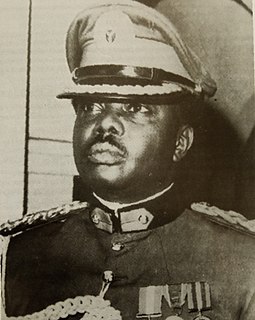
Murtala Ramat Muhammed was a Nigerian general who led the 1966 Nigerian counter-coup in overthrowing the Johnson Aguiyi-Ironsi military regime and featured prominently during the Nigerian Civil War and thereafter ruled over Nigeria from 30 July 1975 until his assassination on 13 February 1976. This period in Nigerian history, from the Northern counter-coup victory to Murtala's death, is commonly associated with the institutionalization of the military in politics.

The president of the Federal Republic of Nigeria is the head of state and head of government of the Federal Republic of Nigeria. The president directs the executive branch of the federal government and is the commander-in-chief of the Nigerian Armed Forces.

The vice president of Nigeria is the second-highest officer in the executive branch of the federal government of Nigeria, after the president of Nigeria, and ranks first in the presidential line of succession. Officially styled vice president of the Federal Republic of Nigeria, the vice president is directly elected together with the president to a four-year term of office.
Abubakar Dangiwa Umar was governor of Kaduna state in Nigeria from August 1985 to June 1988 during the military regime of General Ibrahim Babangida. After retiring from the army in 1993, he became a social critic and the founder of Movement for Unity and Progress, a political party.
The Kaduna Mafia is a loose group of Nigerian businessmen, civil servants, intellectuals and military officers from Northern Nigeria, who resided or conducted their activities in Kaduna, the former capital of the region towards the end of the First Republic.
Liyel Imoke was elected governor of Cross River State, Nigeria in April 2007, taking office on 29 May 2007. He is a member of the People's Democratic Party (PDP).
Garba Duba is a retired Nigerian Army Lieutenant general who was Governor of Bauchi State, Nigeria from July 1978 to October 1979 during the military regime of General Olusegun Obasanjo, and Administrator of Sokoto State from January 1984 to August 1985 during the military regime of Major General Muhammadu Buhari.
Sunday Ajibade Adenihun was appointed military governor of Imo State in Nigeria from July 1978 to October 1979 during the military regime of General Olusegun Obasanjo.
David Medayese Jemibewon is a retired Nigerian Army major general who served as military governor of the now defunct Western State during the military regime of General Murtala Muhammed, governor of Oyo State after it had been created from part of the old Western State during the military regime of General Olusegun Obasanjo, and later as Minister of Police Affairs in the cabinet of President Olusegun Obasanjo after the return to democracy. He was a contender for the Kogi West Senatorial District in Kogi State.
Paul Ufuoma Omu was Military Governor of South-Eastern State, Nigeria between July 1975 and July 1978 during the military regimes of Generals Murtala Muhammed and Olusegun Obasanjo.
Muftau Adegoke Babatunde Elegbede or Tunde Elegbede was Chief of Nigeria's Defence Intelligence Agency from July 1986 to January 1990 and Military Governor of Cross River State, Nigeria between July 1975 and October 1978.
Colonel Umar Farouk Ahmed was Military Administrator of Cross River State, Nigeria during the military regime of General Sani Abacha. He was then appointed administrator of Kaduna State in August 1998 during the transitional regime of General Abdulsalami Abubakar, handing over power to the elected civilian governor Ahmed Mohammed Makarfi in May 1999. Shortly after, he was retired by the Federal Government, along with all other former military ministers, governors and administrators.
Harris Otadafevwerha Deodemise Eghagha was appointed Military Governor of Ogun State, Nigeria from July 1978 to October 1979 during the military regime of General Olusegun Obasanjo, handing over power to the elected governor Olabisi Onabanjo at the start of the Nigerian Second Republic.
Navy Captain Eben Ibim Princewill was Military Governor of Cross River State, Nigeria between 1986 and December 1989, during the military regime of General Ibrahim Babangida. He was allowed to retire from the navy with full benefits at the end of his term in office.
Melford Obiene Okilo had a long and distinguished career as a politician in Nigeria from the start of independence in 1960 until shortly before his death in 2008. He was a member of parliament (1956–1964) and a Minister in the Nigerian First Republic. He was the first elected Governor of Rivers State, Nigeria (1979–1983) during the Nigerian Second Republic. Later he was Senator for Bayelsa East, in Bayelsa State (1999–2003) during the Nigerian Fourth Republic.
Commodore Michael Bamidele Otiko was the first director of naval education in Nigeria, and later was appointed Governor of Ondo State, Nigeria.
Muktar Muhammed was the military governor of Kaduna State, Nigeria from July 1978 to October 1979 during the military regime of General Olusegun Obasanjo. Wing commander Muktar Muhammed played an active role in the coup that brought General Murtala Mohammed to power, and was appointed to the new Supreme Military Council on 30 July 1975. He was appointed governor of Kaduna State in 1977, in which position he was promoted to Group Captain. He retired from the Service of the Nigerian Air Force at the rank of Air Vice Marshal (AVM).
The Governor of Rivers State is the chief executive of the Rivers State government and is one of the governors of the thirty-six states of Nigeria. The governor is supported by the Deputy Governor, both popularly elected for a term of four years. The governor, as head of the executive branch, has the power to appoint commissioners responsible for each of the state's ministries, the heads of parastatals, judicial officers and the state-owned bodies with specific regulatory or administrative duties. They cannot be a member of the state House of Assembly.
Alhaji Tanko Yakasai OFR is a Nigerian politician, human rights activist and former Liaison Officer to President Shehu Shagari. He is a founding member of Arewa Consultative Forum.



